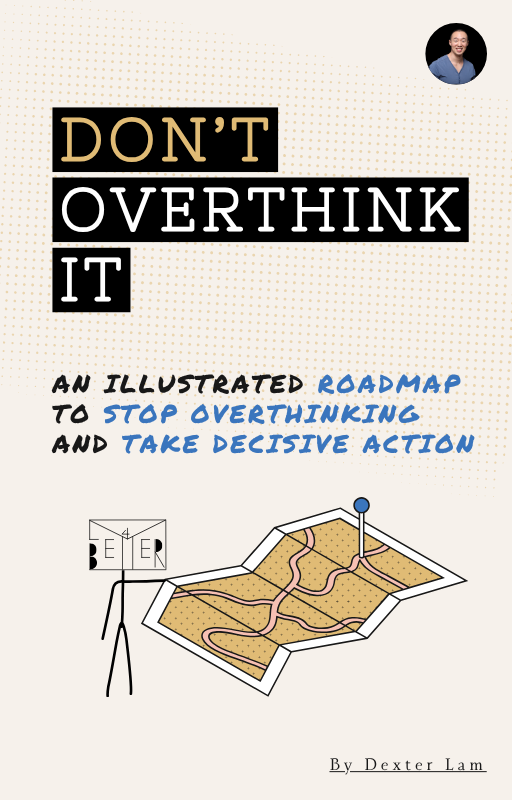Write your awesome label here.
Full Transcript of 10 Reasons You Can’t Stop Ruminating & How to Break Free
[00:00] The Trap of Rumination
If there’s anything we can all agree on, it’s that rumination can be brutal, replaying the same negative thoughts over and over, and over again in your head. But no matter how much time you spend thinking about the same conversation or situation, you never feel closer to peace.
And if you’ve ever found yourself stuck in this mental loop, you know exactly how exhausting it can be. It’s like being held prisoner to your own thoughts, keeping you disconnected from the present moment.
I’ve spent countless hours of my life ruminating, and honestly, I still do sometimes. And it’s normal. But even if we can’t stop ourselves from the start of rumination, the question then becomes: how long are you ruminating for? If you’re spending over an hour a day trapped in your own head, cutting that time down to 5 minutes would already be a major improvement.
[01:00] What This Episode Covers
In this episode, I’m going to break down 10 common reasons why you can’t stop ruminating, and more importantly, tips for how to break free. And if you stay until the end of this video, I’ll be sharing a mindset shift that will help you completely change the way you see rumination, and your relationship to it. So let’s get into it.
[01:23] Reason 1. You’re Searching for Closure
Rumination often begins with something unresolved, like a breakup, a betrayal, or even just a conversation that ended badly. Your brain keeps looping because it’s trying to fix what feels unfinished. But here’s the uncomfortable truth: you don’t always get the closure you want from other people. Sometimes, it has to come from acceptance and being able to crystalize your thoughts in a tangible way.
One of the best ways to do this is by writing a letter you’ll never send, just to get your thoughts out. Even if this letter never sees the light of day, the mere act of expressing your thoughts helps your nervous system release what your mind is holding onto. You can think of it like giving your brain permission to release those thoughts because it now feels like the task is now finished.
[02:21] Reason 2. You’re Trying to Control the Uncontrollable
The brain loves certainty, which is why it seeks control. Rumination tricks you into believing that if you think about something long enough, you’ll somehow gain control over whatever it is that you’re thinking about. But in reality, no amount of mental replay will change the past.
A powerful way to break free is by practicing the Circle of Control technique. Simply draw a circle, write down what you can control inside of it, and everything else outside. What you are essentially doing is giving your brain a visual representation of what’s within your control, so you can stop putting energy into what’s beyond your reach. Because it’s one thing to think about something, but it’s another to visually see and solidify what’s not in your control, so you can let it go.
[03:18] Reason 3. Your Nervous System is Addicted to Chaos
This one is tough to hear, but sometimes the reason we can’t let go of overthinking is because our nervous system has gotten used to the chaos. If your body is constantly in fight-or-flight mode, peace can actually feel uncomfortable, and even unsafe. Neuroscience shows that repetition builds wiring. So if stress has been your baseline, being calm will feel foreign until you begin to practice it.
What you can do is start with just two minutes a day of silence or mindful breathing. When you do this consistently, over time, your brain will rewire itself to associate calm with safety.
[04:04] Reason 4. You Haven’t Learned to Process Emotions
Most of us were never taught how to sit with emotions like grief, anger, guilt, or shame. So instead, your brain does what it knows best….. it thinks. But rumination is often just the act of revisiting unprocessed emotions that play in the background.
Here’s what you can do in this situation: Label your emotions accurately. Instead of just saying “I feel bad,” be more specific. When you label an emotion, like saying “I feel angry” or “I feel sad,” the amygdala, the fear center of your brain, begins to quiet down. And this is because naming your emotions accurately gives your mind the space to contextualize and fully understand what you are feeling, instead of just spiralling in it.
[04:57] Reason 5. You’re Falling Into Thought Traps
Things like catastrophizing, all-or-nothing thinking, and absolute statements are all cognitive distortions that can fuel rumination. And this is because the brain has up to 70 thousand thoughts per day, where negative thoughts become habitual patterns of thinking. This can turn distorted thoughts into beliefs, even if they are not actually true.
A powerful practice you can use is a combination of mindfulness and reframing. When you’re able to catch these distortions as they happen in real time, and then immediately reframe them, what you are doing is reprogramming your default thoughts. For example, if you catch yourself saying “I always mess things up,” then immediately replace it with, “That was just one mistake, and I can learn from it.” When you reframe a thought you’ve been trapped in, you shift your own perspective and the relationship you have with that belief. And eventually, what was once a negative thought, automatically becomes a positive one.
[06:02] Weekly Mindset Newsletter
By the way, if you're looking to stop overthinking, improve your decision making, or make a mindset shift, I come out with a weekly mindset newsletter. It's absolutely free, and I share personal stories that I don't post anywhere else, and it's a great way to connect, so I'll drop a link in the description below.
Enjoying the Read?
Weekly Mindset Newsletter
Get personal stories, decision-making strategies, and mental frameworks to help you stop overthinking, build self awareness, and live with more clarity.
Thank you!
[06:22] Reason 6. You’re Exhausted
A tired brain doesn’t regulate well. When you’re sleep-deprived, your prefrontal cortex, the part of your brain responsible for rational thinking, is less engaged, and your amygdala takes over. When this happens, your cortisol levels can stay elevated, keeping you in a state of stress. This is why everything feels more overwhelming when you’re tired.
Sometimes the best cure for rumination isn’t another mindset strategy, it’s simply rest and recovery. Go for walks, get more sleep and sunlight, and reduce screen time to restore dopamine levels so you can have more motivation and energy, allowing you to think clearly.
Sometimes the best cure for rumination isn’t another mindset strategy, it’s simply rest and recovery. Go for walks, get more sleep and sunlight, and reduce screen time to restore dopamine levels so you can have more motivation and energy, allowing you to think clearly.
[07:04] Reason 7. You’re Too Isolated
As humans we are wired for connection. When you’re alone with your thoughts too much, these negative thoughts end up echoing louder, like shouting in an empty room.
This is why talking things through with someone you trust isn’t just emotional relief, it’s neuroscience. Co-regulation, the process of calming your nervous system through another person’s presence, is a built-in way for your brain to find balance.
[07:35] Reason 8. You’re Overstimulated
Modern life keeps your brain overloaded, with things like doom scrolling social media, constantly reviewing notifications, and multitasking. When this happens, your brain doesn’t get the chance to process or file away thoughts, so they pile up, and can lead to rumination.
In this scenario, a digital detox of even 30 minutes a day can give your mind space to breathe, where silence allows you to sort through thoughts that are important from what’s just noise.
[08:11] Reason 9. You’re Mistaking Thinking for Solving
One of the biggest traps of rumination is believing that if you keep analyzing, you’ll find a solution. But thinking isn’t always solving. In fact, most rumination is just your brain replaying without resolution.
Here’s a tip: ask yourself the question, “Is this helpful thinking or habitual thinking?” If it’s habitual thinking, what you can do is set a timer for 10 minutes where you let yourself worry. This worry window gives you permission to overthink during that time, so you can let it go and move on with your day.
[08:52] Reason 10. You Haven’t Replaced the Habit
The truth is, you can’t always simply stop ruminating, you have to redirect your attention. Your brain needs something else to focus on.
This could be journaling, doodling on a piece of paper, deep breathing, or even moving your body. Every time you replace rumination with something grounding, you’re teaching your brain a new pathway. And through neuroplasticity, repetition turns that refocused pathway into your new normal.
[09:22] Conclusion: Redefining Rumination
Here’s what I’ve learned about rumination. It’s not about shutting your brain off, it’s about training it to work with you instead of against you. Your thoughts are not the enemy, they’re simply signals. And when you can decode those signals that point to your need for closure, rest, or connection, you break the cycle.
So the next time you catch yourself ruminating, I want you to pause and remember that: your time and energy are your most valuable assets. The longer you spend trapped in these negative thoughts, the higher the cost you are paying with your time and energy.
And every time you can refocus these thoughts and attention, you give yourself back the time to spend it on yourself, your body, and the present moment. Where the present moment is where you find peace.
[10:18] My Question to You
So which one of these reasons are you struggling with right now? Let me know in the comments below because I read every single one of them.
[10:27] Outro - Let’s Grow Together!
My name is Dexter and I appreciate your time. I'm a mindset coach and I talk about self-awareness, decision making, and living a purpose driven life. If you like this content, please don't forget to subscribe and also share this with someone else who you believe might also be struggling with rumination or overthinking, so you can help them to overcome it too. And have a wonderful day. Bye bye.


